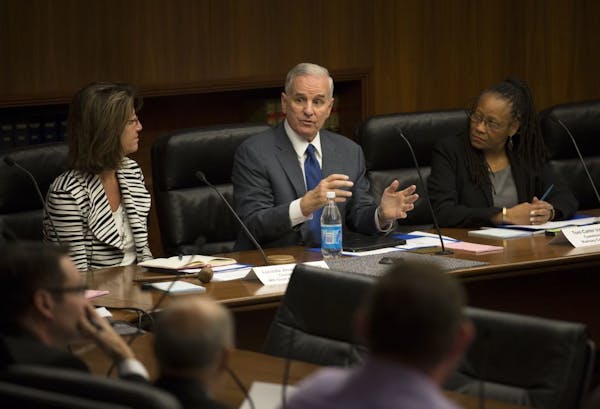DULUTH – People at the front lines of protecting children in Minnesota offered divergent explanations Wednesday for the system's failures: underfunded and overwhelmed social workers, abuse reports that go nowhere, a policy that appeases rather than punishes abusive parents.
The second meeting of Gov. Mark Dayton's task force on improving the child protection system revealed tensions between child protection workers and mandated reporters, police and children's advocates. The task force also revealed that it will break into groups reflecting areas of focus likely to produce proposed reforms.
Stacey Achterhoff, a Duluth public schoolteacher who works with homeless families, testified that she routinely makes reports about children who miss excessive days in class but then hears from child protection workers: "I stuck my card in the door."
"If being a mandatory reporter is my obligation, then treating my report as a valid cause for concern and action is a child protective services obligation," she said. "Workers have told me directly that their caseloads are so large, they can't make time for cases of educational neglect."
Child protection agencies routinely screen out nearly three-quarters of reports. One of the task force groups will look at how counties decide whether to accept a report for services. That group will also address another concern brought up by Achterhoff: that the system needs more transparency.
Another work group will look at the adequacy of resources available to child protection. David Vukelich, a social worker with St. Louis County Child Protection, said he assessed close to 120 cases last year, a caseload he called "completely overwhelming."
"If any agency is operating at that level for every worker, that's a disaster," Vukelich said.
Task force members asked what could immediately be done to reduce that burden. The child protection workers' response: Eliminate redundant tasks, hire more social workers and add clerical staff.
"People like me need to be out in the field investigating," Vukelich said.
The resource group will also take a look at family assessment, which avoids investigating whether abuse has occurred. That program was initially meant to address less-serious abuse cases, but is now the preferred response to thousands of cases in which children are at high risk for more abuse.
Lisa Edmundson, a Carlton County child protection investigator, said her office often clashes with law enforcement when her agency wants to use family assessment, and police want to investigate whether a crime has occurred.
Edmundson said family assessment makes it more likely that the family members will work with child protection.
"We have different mandates [than police]," she said. "We often have to agree to disagree."
Family assessment was assailed in a survey taken in the past two weeks by the board of Guardians Ad Litem, whose members are appointed in juvenile and family court cases when child abuse is suspected. Guardians criticized the program as an inadequate substitute for investigation and expressed frustration that cases can be closed after families reject services.
The task force group has been charged with reviewing many of the problems listed by the guardians, as well whether the use of family assessment needs more study.
Another work group will look at training and supervision of child protection workers. Edmundson said there's a high turnover rate for child protection, with workers who leave often replaced by "very young people who have probably never been exposed to the situations they're walking into."
The three subgroups must get their initial recommendations to the full task force by Dec. 5. The governor has ordered the task force to bring its first suggestions for improvements to his office and the Legislature by the end of December, and make final recommendations by March 31.
Brandon Stahl • 612-673-4626
DFL state senator charged with first-degree burglary in break-in at stepmother's home
Biden blames Trump for Florida's 6-week abortion ban, says women nationwide face health crisis
Biden's Morehouse graduation invitation is sparking backlash, complicating election-year appearance

